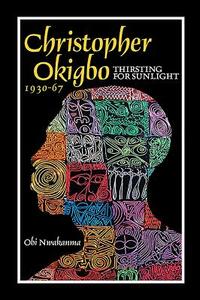Take a photo of a barcode or cover
informative
inspiring
reflective
medium-paced
This was a great find of a biography. Okigbo - like his poetry - is much better known inside Africa than outside it, and the book has only got an international release in 2017, although it was published in Nigeria in 2010*. Nwakanma takes a relatively straightforward approach, dividing Okigba's life into chronological sections, but uses each as a springboard to dissect Nigeria in the 1940s to 1960s. Like Achebe, Okigbo was raised in a Christian household but with the broader familial network embedded in Okigbo spirituality. Okigbo and Achebe were then both sent to the same elite selective school at Umuahia, and attended the humanities focused University College at Ibadan. Okigbo joins private industry and proves too proud, becomes a civil servant and proves too bored, as deputy principal he is brilliant, adored and idolentt and then later joined the initial faculty of Nigeria's first full university at Nsukka as acting University Librarian, the role which first drew him to my attention. He was, by this account, a brilliant curatorial librarian but less excited by the process elements of the career. He then tried publishing, before his final, short-lived, role as soldier.
There is little, based on this biography, I would have enjoyed about Okigbo. His poetry is undeniably brilliant, but so firmly in a classical tradition that prizes clever over raw, that even that I admire more than love (I read his Labyrinths alongside this) His relationships with women are... well, his wife exhausedly explains that it would be "just like Christopher to claim to have divorced me in order to impress his friends" in debunking the myth that he had severed their marriage when Biafra severed from the her native north. And his idea of free love was encouraging his young lovers to have sex with his friends. He was careless, and possibly the worst employee I've read a biography of (as deputy principal he failed to adapt to getting out of bed before noon). (His civil service escapades provided inspiration for Achebe's tragic No Longer At Ease, but Okitragy have been motivated by boredom and wanting many mistresses than that character's noble protagonist).But he was clearly brilliant, and warm, and passionate - and lived through such interesting times with so much gusto. There is a wonderful anecdote towards the end of the book when Wole Soyinka arrives in Biafra as an emissary of sorts, and is arrested. Okigbo gets in to see him, and the men immediately embrace fiercely with laughter and exerburance, and still holding each other tightly dance a jog around the room- both with loaded guns, one of which blows a hole in the ceiling but it fails to stop the jig.
It is in explaining the times the book excels. Nwakanma brings the football fields and dormitories of Umuahia to life, he akes you feel the student editorial debates at Ibadan, and the slightly delirious panic of the Biafran army. You get such a sense of what intellectual intensity Okigbo and his contemporaries were shaped by, and intellectualism that collides with rapid political and social upheaval. You feel the tragedy of Okigbo as one than the loss of a brilliant dilettante- it is the loss of that boundless certainty which buoys idealism in a generation that had picked from the best of Igbo, Christian and Secular worlds.
*The edition also lacks a proper edit. Errors abound, the most amusing of which is describing the Australian Quadrant magazine as a Communist publication, but most of which are more mundane date transposition.
There is little, based on this biography, I would have enjoyed about Okigbo. His poetry is undeniably brilliant, but so firmly in a classical tradition that prizes clever over raw, that even that I admire more than love (I read his Labyrinths alongside this) His relationships with women are... well, his wife exhausedly explains that it would be "just like Christopher to claim to have divorced me in order to impress his friends" in debunking the myth that he had severed their marriage when Biafra severed from the her native north. And his idea of free love was encouraging his young lovers to have sex with his friends. He was careless, and possibly the worst employee I've read a biography of (as deputy principal he failed to adapt to getting out of bed before noon). (His civil service escapades provided inspiration for Achebe's tragic No Longer At Ease, but Okitragy have been motivated by boredom and wanting many mistresses than that character's noble protagonist).But he was clearly brilliant, and warm, and passionate - and lived through such interesting times with so much gusto. There is a wonderful anecdote towards the end of the book when Wole Soyinka arrives in Biafra as an emissary of sorts, and is arrested. Okigbo gets in to see him, and the men immediately embrace fiercely with laughter and exerburance, and still holding each other tightly dance a jog around the room- both with loaded guns, one of which blows a hole in the ceiling but it fails to stop the jig.
It is in explaining the times the book excels. Nwakanma brings the football fields and dormitories of Umuahia to life, he akes you feel the student editorial debates at Ibadan, and the slightly delirious panic of the Biafran army. You get such a sense of what intellectual intensity Okigbo and his contemporaries were shaped by, and intellectualism that collides with rapid political and social upheaval. You feel the tragedy of Okigbo as one than the loss of a brilliant dilettante- it is the loss of that boundless certainty which buoys idealism in a generation that had picked from the best of Igbo, Christian and Secular worlds.
*The edition also lacks a proper edit. Errors abound, the most amusing of which is describing the Australian Quadrant magazine as a Communist publication, but most of which are more mundane date transposition.

